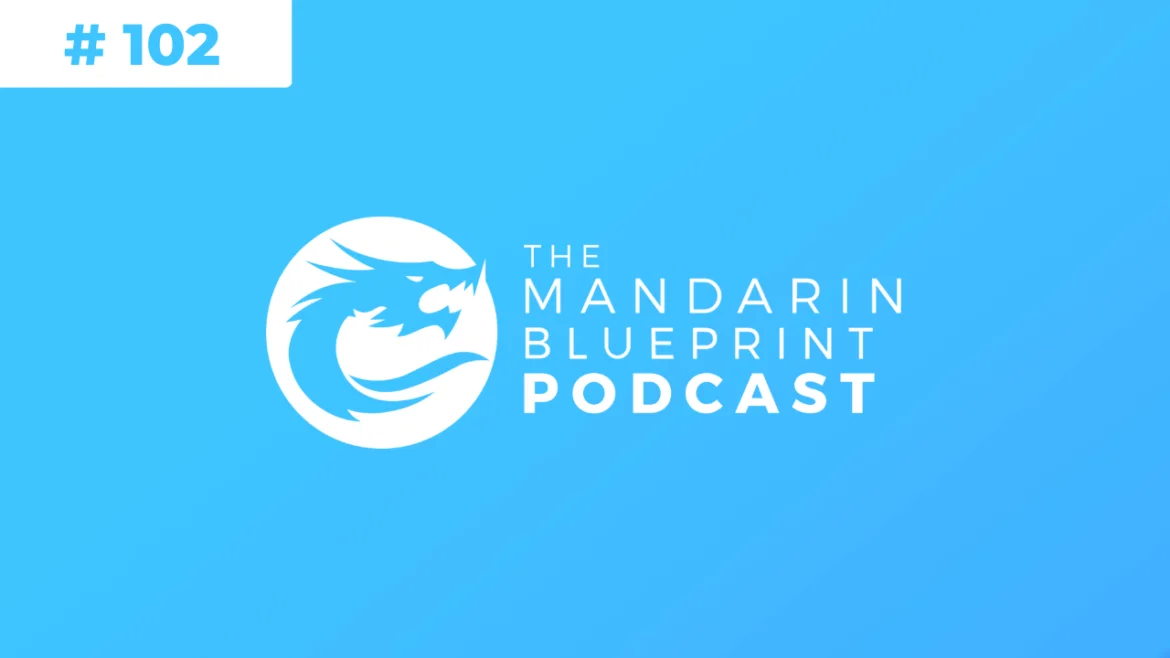
102. Traveling China Speaking Mandarin
欢迎光临! Welcome!
You can now subscribe to the podcast by the links below, or you can subscribe by copying the following URL into your favorite podcast APP.
The Mandarin Blueprint Podcast focuses primarily on The Blueprint online curriculum. Creators Luke Neale & Phil Crimmins answer questions and comments, discuss topics related to China and Mandarin learning, and have special guests.
Want to learn how to speak fluent Chinese fast? Join our free Webinar right here.
欢迎光临! Welcome!
You can now subscribe to the podcast on iTunes, Stitcher, Spotify, or you can subscribe by copying the following URL into your favorite podcast APP:
https://www.mandarinblueprint.com/feed/podcast/
The Mandarin Blueprint Podcast focuses primarily on The Mandarin Blueprint Method online curriculum. Creators Luke Neale & Phil Crimmins answer questions and comments, discuss topics related to China and Mandarin learning, and have special guests.
0:00 Affiliate Link & Reviews
Become a Mandarin Blueprint Affiliate
Leave us a Google Business Review 🙂
6:14 Comments & Emails
Neil Rogers by Email
Hi Luke & Phil,
Help.
I am feeling a tad swamped and not sure if I am just making my standard mandarin learning more difficult than it needs to be, my progress seems to be very slow going. Admittedly I have not been able to give 1 hour every day during the working week. I am able to give up to 2 or 3 hours at the weekend. So the amount of time I give fluctuates but is something like this for an average week:
M – 30 mins;
T – 1 hour;
W – 1 hour;
T – 0;
F – 30 mins;
S – 1 hour;
S – 3 hours.I am determined to work through the MB material properly to make sure I get to grips with pronunciation mastery before I even think about the MB Foundation Course. Even though I have been away on holiday for two weeks it has taken me 2.5 months to get to the end of Unit 2. Including a full review of Unit 1. I am about to review Unit 2 and to go through the very helpful emails you sent through last month.
My general approach to learning the MB material has been to watch the video clips (usually more than once). Any video clip with spoken mandarin I listen to when practicing multiple times. I then review every video clip making notes. I then read through the information, pro tips, and bonus material by making notes and making sure I understand them before I click the lesson completed button.
I have just downloaded Anki for my Android. Do you have a PDF tutorial for Android? You mention that:
‘Anki will become your most significant tool for remembering everything taught in these videos, and anything you want to keep in your short-term memory in the future as well.’
I noticed that the Anki flashcards are for Unit 2 and Unit 3. Do you have flashcards for Unit 1 material as well?
I am a visual learner and learn by doing. I am also an INFP on the Myers Briggs Type Indicator.
Many thanks for your help,
Neil. 🙂
12:59
Melanie Fairhead by Community
Hi everyone,
New here and enjoying the program so far. I would like to take the HSK tests to see my progress. Is there a way to tell when you’re ready to take let’s say HSK1 in the program? How will we know what level we’re at as we go through?
16:19
Evan hall by Community
I’ve really enjoyed working through the mandarin blueprint method. I have just reached phase 3, it’s very exciting finally reading some sentences. now that I’m speaking much more, in the practice, I find my voice is fatiguing very fast and starts to feel scratchy in my throat, especially on 3 tone words, making daily practice something not as enjoyable as it has been for the last 6 weeks. Trying to speaking with less effort makes it sounds farther from the native examples. would love to hear if others have come across this problem.
19:09
Christine on BONUS: “How Does What” – Adverbs Expressing Tone of Voice
I love these grammar points. It really helps to clarify some of the sentences that we have already read but might not have understood clearly. Thank you!
20:59
Chris Lewis on BONUS: Characters Strokes and Stroke Order Rule #1
Fantastic lesson. I can’t believe there are so few strokes.
22:04
Soren Korsbaek on 看书看到多少页了
Hey,
I have found a few of what I believe to be top-down words in some of the conversations/opinions, however unlike the normal ones I am unable to sanity check these as I can’t copy + paste the characters from the videos. This includes the text files to download as they are in image form. With this in mind, I have often skipped trying to make sense of parts with these characters which are a bit unsatisfying, however for this one as the top-down word missing is included in the title I have been able to, I believe, verify it is a top-down word:
“到”
It’s often the case that I think I remember and have worked out the correct meaning, but given the lack of translation, I am unable to verify this which leaves me a bit insecure as I can convince myself of a wrong meaning of for instance a word combined with several characters that I haven’t seen recently or yet in the flashcards. I realize it’s intentional not to provide the translations but just wanted to point out I would definitely
find it useful still at this stage.The main thing I struggle with is not being able to “check” words I believe to be top-down words.
As ever thanks again for an awesome course! I wanted to share how I’ve experienced the videos, conversations and opinion pieces so far at this early stage.
22:04
Christine on Navigating Phase 4 Dialogues, Opinions & Stories
Hi Luke and Phil
Thanks for the new format, in general, I love the new structure and thanks for all the hard work that went into it. 但是! I have suddenly realized that there is no way now to access the actual text anymore. The text is now in the form of an image.I use the text in conjunction with the mp3 to load these into Workaudiobook, which I then use to listen and read the text phrases one at a time. It really helps with shadowing to be able to repeat the individual sentences within the bigger piece.
It would be ideal if you could just include a text file as well into each zip, but I know that means going back and redoing the zips so might be a lot of work.
How about just attaching one text file with all the texts into this lesson? Or maybe just email me the texts? Please please please!!
Thank you!
24:11
Jose PG on New Vocabulary Unlocked! 等等
In this phrase: 等等,他马上就关门了。… 马上 and 就 seems like they share a similar meaning, are they commonly put together to mean “about to do sth.”?
I ask because I’m having trouble giving the phrase the sense of “he’s about to close the door.” because in my head it seems that I could give it the same meaning by omitting 就 and leaving it as: 他马上关门了。How does 就 add something to the phrase? … thanks!!
27:30
Jose PG on New Vocabulary Unlocked! 中间
What is the role of 到 in this phrase: 别走到马路中间。(Don’t walk in the
middle of the street.)
29:02
William Beeman on New Vocabulary Unlocked! 女人
The first sentence is simple 我是个好女人, but what about adding 一?
So:
我是一个好女 人. Are they the same?
30:31
William Beeman on New Vocabulary Unlocked! 美女
Someone told me that 美女 was an OK way to hail a waitress in a restaurant. Is this so? I wouldn’t want to insult anyone.
35:53
William Beeman on New Vocabulary Unlocked! 女儿
我女儿个子长高了–what does the 个子 do in this sentence?
37:22
Rick Angleland on It’s a Word! 开
Would 走开 be a useful vocab word to add here? I’m not sure if the compound is already covered by grammar rules, but I see it is an entry in the Dong Chinese online dictionary. I heard that 开 can mean “spread” as well as open, and so in this compound it sort of expresses spreading apart.
41:29
Alexandra on (BONUS) The Language Learning Tripod Part 3: Time
This is great! I will check out Happy Chinese as I was wondering what simple Chinese podcasts/youtube I could listen to to help with my recognition. Phil and Luke, do you have anything else you could recommend would be good to listen to “in the background” that might be simple enough for a beginner to follow along with?
Thanks.
46:09
Ric Santos on It’s a Word! 在
For while back there I had a doubt about where I placed my Actor in character # 5 “干”。Yes the blade was still up the cross to dry up because the entrance -1st tone- was flooded. But several days later, after the flood dried up, my Actor took the blade and the cross to DO something at the backyard, so now is in the 4th tone.
49:47
Micaela Ellison on New Vocabulary Unlocked! 上来
Thank you so much for getting rid of pinyin early in the course!
If it’s there, I can’t NOT look at it. Even if I don’t want to, and even if I don’t need it. In my experience, too many students rely on pinyin for far too long. Reading sentences without it right from the start feels so much better.
50:31
Theodore March on ANKI DECK(S) INSIDE – Level 9 Complete
I’m starting to know the characters we’ve studied on sight, when I see them everything about them just pops into my head, no movie necessary. It’s a really powerful tool you’ve created.
53:19
Theodore March on MAKE A MOVIE 止
What’s the difference between 止 and 停?
57:02
Alexandra on Compound Final AO: 澳大利亚 àodàlìyà,好 hǎo,你好 níhǎo,你好吗 níhǎoma?
Are the “Common Words that Use AO Final” (and other common word
lists previously provided) part of the Anki decks? Should be be adding these to practice pronunciation or should we just practice using these PDFs? Thanks.
59:16
Jose PG on New Vocabulary Unlocked! 想法
In this phrase: 在工作上儿子有什么好的想法?… What is the role of 上 in it?
1:01:52
Korneel Sn on Pick a Prop ?
It’s a prop, why does it need to be related to a keyword?
1:03:03
Jason Pon on It’s a Word! 羊
这只羊是白的
On the usage of 的, I recall there being an earlier sentence where this construction was also used. There is an implied word following the 的 to denote possession. In this case, what would that implied word be. Would it be 羊? To make 这只羊是白的羊, to mean literally “This sheep is white of sheep (or sheep’s white)”?
1:05:27
Rayna on (BONUS) How to Find & Fix Pronunciation Problems
The mobile app (in Android at least) does have the option to record one’s own voice and play it back. Within a card tap the 3 dot menu button, then tap Edit Card, scroll down to Audio and click the paperclip “attachment” icon. Give the Anki app permission to record audio. Press the red Record icon that appears to start recording, and tap again when you are finished.
Click the checkmark to save the recording. Go back to your flashcard and a new arrow icon with your recording will be visible. It will play last after the other audio on the card. Of course, you can delete and re-record at any time in the future as well.
1:07:52
Ramona on New Vocabulary Unlocked! 星期
I’ve always had a hard time remembering this word (星期). Is it ok if I use for Monday 周一 instead of 星期一?
I’ve actually heard and seen Chinese people referring to Monday
using 周一.Thanks guys!
1:10:30
Chris Lewis on The Drawbacks of Having Bad Pronunciation
Is there a way to download the videos for offline playing?
1:11:10
Chris Lewis on Pick a Prop for 二 – Ever seen “The Shining” by Stanley Kubrik?
Is there a way to have the video “auto-move-on” after it’s finished the last one?
1:11:46
Chris Lewis on What About the Mandarin Tones?
When I pick a set, could it be different rooms in the same high school or better to have three distinct places as not to get confused?
-an (Band room)
-ai (“Eye of the Tiger” Football changing room – motivational music we played to get us pumped up)
-eng (English music teacher’s room in same school)?
1:14:32
Julie Hentschel Lund on It’s a Word! 种
Could you please explain how this sentence work?:
别说这种话。
The translation says “Don’t say that type of thing”, but shouldn’t it then be na4 instead of zhei4, since the translation is “that” type?
Also, just to confirm, the 话 indicates that it is spoken language rather than in written form, right? If I only had used 说, it could be either or?
1:17:59
Julie Hentschel Lund on New Vocabulary Unlocked! 几(个)
How do I know it’s ” I’ve been in China…” instead of “I will come to China in a few months”?
我来中国几个月了。
English:
I’ve been in China for a few months.
1:19:57
Micaela Ellison on New Vocabulary Unlocked! 几(个)
So without the 了, does the sentence translate to: I’m coming to China for a few months? If I wanted to say I’d spent a few months in China in the past, would I use 呆 instead of 来? For example, could I say 我呆了中国几个月? Or based on a sentence we learned earlier in Level 13: 我在中国呆过几个月.
1:21:57
Micaela Ellison on It’s a Word! 香
Is 桌菜 one word here? Or is this a case where you could use 的, as in 这桌的菜非常香?
1:24:20
Micaela Ellison on New Vocabulary Unlocked! 飞机
I think you can also use 上 for the action of boarding a plane (and 下 for deplaning). For example, 我马上上飞机. Is that right?
1:26:20
Micaela Ellison on New Vocabulary Unlocked! 总是
Is there an implied word after 别的 to indicate the meaning of “things”?
Sentence
休息日我总是休息,不干别的。
English:
I always rest on my day off & don’t do anything else.
Top-Down Words:
不 bù – not; won’t; not want to
干 gàn – (alternate pronunciation) to do
别的 biéde – other (things)
1:27:53
William Beeman on New Vocabulary Unlocked! 没关系
Hi guys, can you parse this phrase? 没关系. It’s meaning is really not obvious from the individual characters, except for 没 of course. One can just memorize it like “welcome” in English, but it always helps to know the derivation of the phrase.
1:29:37
Alexandra on Unit 4 Wrap-Up
In pinyin, does the tone marker always sit on the first letter of the Final? If not, what determines where it sits?
1:31:17
Andreas Lienemann on Make a Movie 皮
I don’t see why the elf prop is even necessary in the construction of this character. Could it not just be a samurai sword and whatever we choose as the prop for 支 (a branch in my case)?
1:32:51
Ann Bihari on BONUS: Helper – Expressing That an Action Has Happened Before with 过
Curious if people in China typically answer yes to the question “have you eaten” when used as a “how are you?” (even if they haven’t eaten yet) similar to how we always say we’re doing well or fine in english when asked.
1:34:30 Movies!
This blog post explains the theory behind Movie Scenes and learning characters.
Christine on Make a Movie 斤
My Ji actress is outside my old high school (en location). She has to help out with the school fete. The old aunties baking stuff need exactly 1/2 kg of butter for each set of scones but they delivered 1kg blocks. So there is an assembly line set up with the 1kg blocks of butter coming past. Janine first cuts each one in half with the razorblade, then uses the stick two sweep each 1/2kg block into a bucket, ready to be used.
1:36:03
Ramona on Make a Movie 告
I find my G-actor eating beef soup (⺧ ) in the bathtub!
With his mouth (口) full he begs me not TO TELL anyone about this
1:36:54
Della Fuller on Make a Movie 搞
Gabriel entered into the Brownell livingroom to find Yao Ming ENGAGED IN twirling a basketball on his finger.


